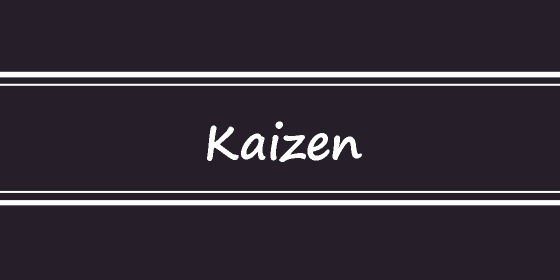Kaizen

Kaizen is a Japanese term that means “change for better” or “continuous improvement.” In the context of business management and Lean methodologies, Kaizen refers to the philosophy and practice of making small, incremental improvements to processes, products, or services over time.
Key points about Kaizen include:
- Continuous Improvement: Kaizen emphasizes the value of ongoing, incremental improvements. It encourages organizations and teams to constantly seek ways to enhance efficiency, quality, and performance.
- Involvement of All: Kaizen is not limited to management decisions. It involves everyone in the organization, from frontline workers to top-level executives. Employees at all levels are encouraged to identify improvement opportunities and contribute ideas.
- Elimination of Waste: One of the goals of Kaizen is to identify and eliminate waste (Muda) in processes. This includes activities that do not add value, lead to inefficiencies, or create unnecessary costs.
- Standardization: Kaizen seeks to establish standardized processes and best practices that can be continuously improved upon. Standardization provides a baseline for measuring progress and ensures a consistent approach to problem-solving.
- PDCA Cycle: Kaizen often follows the Plan-Do-Check-Act (PDCA) cycle, which aligns with the iterative approach of continuous improvement. The PDCA cycle involves planning improvements, implementing them, checking the results, and acting on lessons learned to make further adjustments.
- Visual Management: Kaizen often employs visual management tools, such as Kanban boards, to make improvement opportunities and progress visible to all team members.
- Cultural Aspect: Kaizen is not just a set of tools or techniques; it is a cultural mindset that values incremental progress and empowers employees to take ownership of improvement efforts.
- Small Steps, Big Impact: Kaizen recognizes that small, manageable changes can lead to significant overall improvement when consistently applied over time.
Kaizen is a cornerstone of Lean management and is widely adopted in Agile methodologies and Total Quality Management (TQM). It is rooted in the belief that organizations can achieve substantial results by fostering a culture of continuous learning and adaptability.
By embracing the principles of Kaizen, organizations can create a work environment that encourages collaboration, innovation, and problem-solving at all levels. It enables teams to respond more effectively to challenges, continuously enhance their processes, and deliver greater value to customers. Kaizen is not a one-time initiative but a continuous journey towards excellence and sustained success.
Warning!
When it comes to Business Agility, the traditional understanding of Kaizen can have negative consequences. However, it isn’t completely irellevant either.